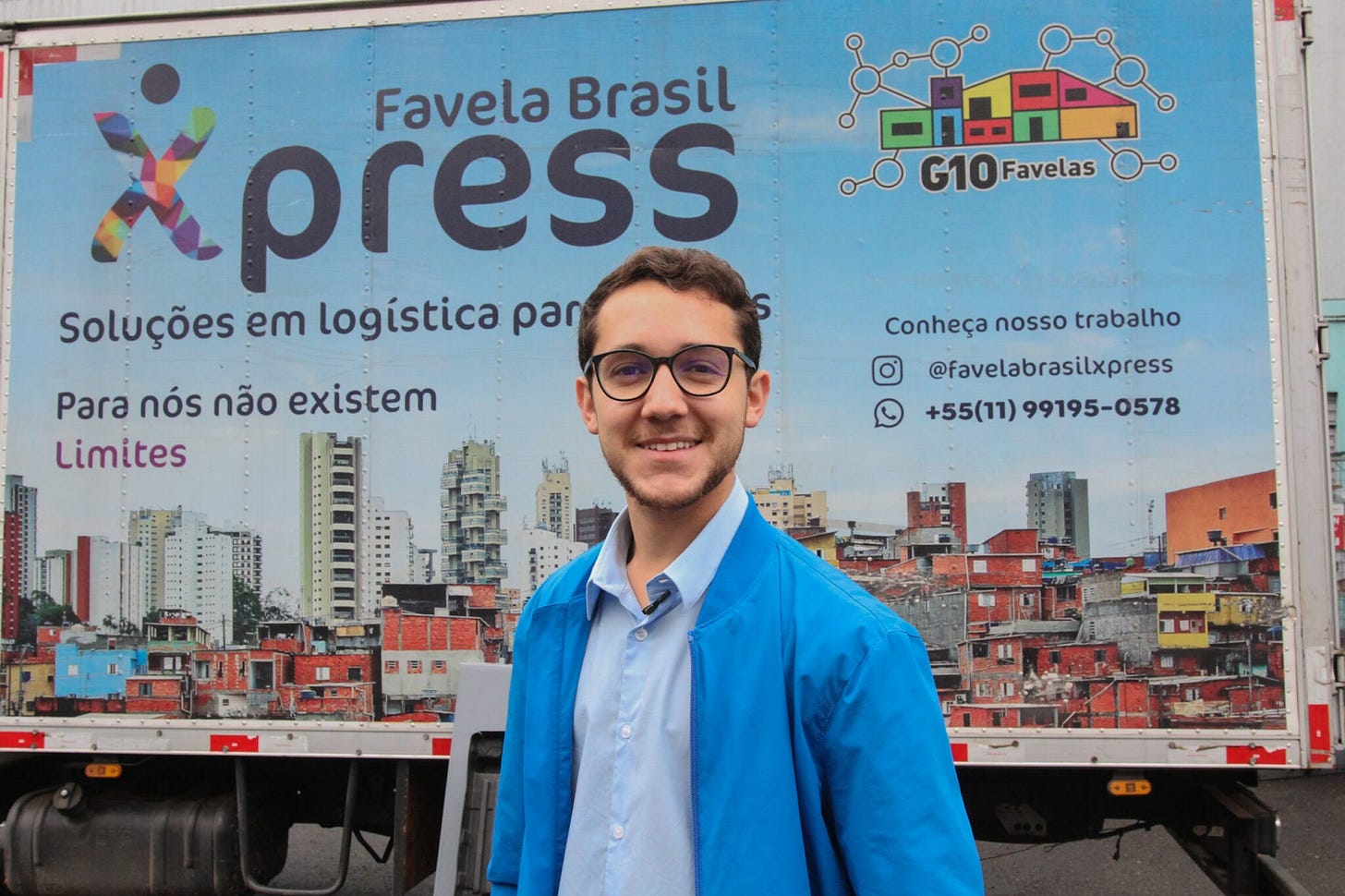Most of my professional career has been not only in tech, but urban logistics. I spent most of the last decade at companies using software to move goods and people around cities more efficiently. It’s a problem-space I know well, so when I heard about Brazil’s last-mile delivery platform, Favela Xpress, my interest piqued.
Brazil has had on-demand/last-mile delivery providers for years. Favela Xpress, though, serves neighborhoods – known as favelas – that are cut off from the formal economy around them.
These are places that developed in the shadow of official neglect. What infrastructure they do have – housing, roads, etc – has been built disconnected from municipal systems.

To understand the depth of this disconnection and why Favela Xpress is so important, though, a brief history lesson is in order.
What are favelas and where did they come from?
Favelas exist in every major city in Brazil and many were originally founded by freed slaves after emancipation in 1888.1 These communities became neighborhoods for the urban working class and grew over time as people fled rural poverty.
The first favela-dwellers were squatters. They built housing on public land and while city governments didn’t necessarily stop them, they weren’t lending a helping hand either. Fast forward to present day, and many residents still hold no official title to land that their families have lived on for (in some cases) over a century.

Historically, favelas were built without access to municipal sewage systems or power grids. Building inspectors didn’t enforce codes and city planners never provided for roads. What infrastructure does exist has, in many favelas, been built piecemeal by the residents themselves over time.2
Given the state of infrastructure in these communities, delivery can be quite difficult. Roads narrow to become alleyways or staircases, making them impassable by car. On top of that, official maps often don’t exist; even Google hasn’t completely charted every corner of every favela. As a consequence, many houses don't even have an official address.
This has cut favela residents off from Brazil’s ecommerce boom, because it’s often impossible to deliver online purchases. Delivery instructions like “the blue house four streets up from the entrance on the other side of that one alley by Gerson who sells salgadinhos on Tuesday” are decidedly hit-or-miss.
Complicating all this is the sheer scale of many favelas. While most are something like a couple square miles in area, they often have super high population densities. The Rocinha favela in Rio de Janeiro, the largest such community by population, is home to an estimated 150,000 to 300,000 people in less than one square mile. That’s two to four times the population density of Manhattan in a place built without official sanction or support.
As a resident of the Paraisópolis favela in São Paulo, this was the world in which Giva Pereira, the founder of Favela Xpress, grew up. And after a delivery of textbooks failed to make their way to his home, it’s the problem he decided to solve for his community and communities like his all over Brazil.
Favela Xpress Connects Favelas to eCommerce
Favela Xpress partners with companies like Amazon and Mercado Livre for last-mile delivery. Favela residents place orders online like everyone else, and their packages get sent to a Favela Xpress distribution center. From there, they're queued up for delivery by a courier who actually lives in the relevant community (and therefore knows where things actually are).
The company’s hiring model is important for two reasons. First, locals understand how their community is physically laid out and this allows Favela Xpress to complete deliveries that others cannot. Second, the company generates employment at the same time that they’re providing access to online commerce.
Now, just having locals who know their way around is not a fully scalable solution. That's why the company is also helping to implement Google Plus Codes.
Google Plus Codes are an address system that uses a location’s geographical coordinates. This open source project was originally launched by Google’s engineering office in Zurich as a way to index physical locations without a formal address.
For its part, Favela Xpress distributes placards to residents so that couriers can identify their house by Plus Code. To date, tens of thousands of its customers in over half a dozen favelas now use Plus Codes to receive deliveries.
Favela Xpress is serving as a critical link between favelas and the rest of the Brazilian economy. And before we trivialize any of this work, we should remember this isn’t just saving someone a drive to the local Walmart.
For various reasons, consumer goods in Brazil can be quite expensive. The expansion of online retail has helped lower those costs in recent years, but access hasn’t been equal across the country. Many of the things that are available online – textbooks, for example – are either not available or obscenely expensive otherwise. Connecting people with eCommerce is an important part of improving their material conditions.
According to Giva, the plan is simply to keep growing. He wants to expand to communities all over the country, redeploying the playbook he developed in Paraisópolis. He has a long road ahead, but by all accounts the plan is working and it’s just a matter of continuing to execute.
Bigger Pictures and Larger Lessons
Although favela is a Brazilian term, favelas as a phenomenon are not unique. Cities across Latin America, Africa, and Southeast Asia have populations living in similar circumstances, for similar reasons.
Cities, to borrow a phrase from Ed Gleaser, are engines of opportunity. They offer an escape from rural poverty and often serve as a springboard into the middle class. But for the over a billion people who live in favela-like communities worldwide, physical, social, and institutional segregation creates barriers between them and opportunity. Any work that bridges that gap (like Favela Xpress) stands to help a lot of people, especially those who need it most.

Taking a bigger step back, there are lessons here for even cities in the “developed” world.
Opportunity is not equally distributed and no design choice is ever value-neutral. There’s a longstanding discourse about this in the legal, political, and social arenas. We could better appreciate how this manifests in the built environment as well.
Stories like Favela Xpress are important not only because they’re about bridging a gap, but because they remind us that a gap exists in the first place.
They’re also reminders that while cities can be platforms for material prosperity, even when they’re good, they’re not perfect. Opportunity is never apportioned equally, and not every community is automatically brought along. So while we work to fix the mistakes built into the literal foundations of the places we live, we should also keep a critical eye on the way we build our cities going forward.
At least in Rio de Janeiro, this also included soldiers returning from Brazil’s last big war.
In recent decades, municipal governments have begun trying to extend public infrastructure into the favelas, but the process is ongoing.






Fascinating. A great reminder of the entrepreneurial ingenuity that exists within cities. I'm also struck that many favela-dwellers do not hold title to their land even after a century of residency. Perhaps Brazilian law does not have a tradition of homesteading, but granting title to the underlying property through a homesteading process would create wealth and property rights, allowing for that wealth to be traded...which could be a costless poverty reduction program for Brazil.